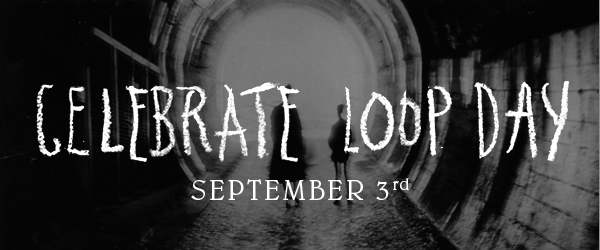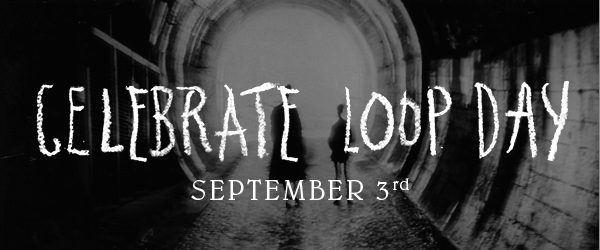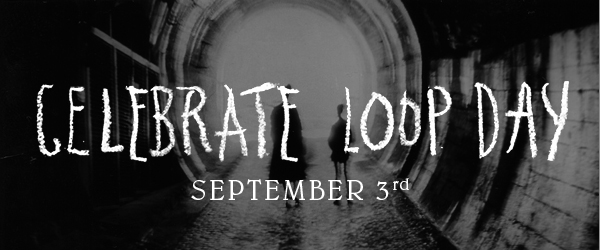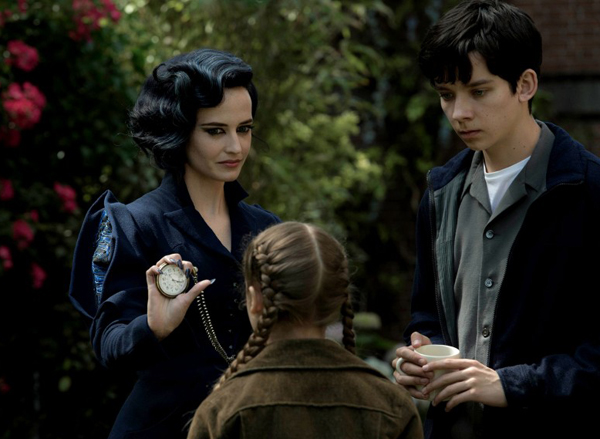A Most Peculiar Loop Day: How to Celebrate September 3rd
Ed. Note: Greetings, Peculiars! In advance of Loop Day—September 3rd—we've asked one of the peculiar children to advise on best practices for celebrating and enjoying this most special day.
Bother and drat. Loop Day is nearly upon us and I’ve only just begun to prepare for our celebration! My name is Horace Somnusson, and as usual I’m in charge of decorating; it’s a widely-acknowledged fact that I’m the only one of Miss Peregrine’s wards with any sense of style. Well, I suppose that’s not entirely fair – Millard has a little style, when he bothers to wear clothes at all – but compared to me his sartorial acumen is like a pebble lost in the shadow of a mountain.
I could go on (Bronwyn: shall I compare thee to a brick draped in burlap?) but as I said, I’m short on time and long on festive decorations to curate. And despite my many important responsibilities (and rather against my will), I’ve been nominated to educate you all about the ins and outs of Loop Day. Some of you, I’m told – even people who have never lived in a time loop – may want to celebrate along with us this year. Why, I can’t imagine. But can I stop you? No, I cannot. So read on.

Some background for the uninitiated: until recently, my friends and I lived in a time loop on a small island where every day was just the same: sunny, balmy, a little rain-shower in the late morning. The date was September the third. And because every day was that date, and none of us in Miss Peregrine’s house were born on that date, it was never anyone’s birthday. Nor was it ever a holiday. (If Miss Peregrine had looped Easter, at least we would’ve been eating chocolate eggs every day. But September third in Great Britain is not a particularly special day.) So to make up for all the holidays and birthdays we were missing, we made up our own special day, in which we celebrated them all at once in the biggest and best and most peculiar holiday in the world. We call it Loop Day, and observe it on the one day of the year when the calendar date outside our loop coincides with the one inside our loop. (Inside our former loop, that is. I still can’t believe it’s gone.) Even though we no longer live there, we celebrated Loop Day for more than seventy years, and it’s become something of a tradition.
So how does one celebrate Loop Day? I’ll tell you. First, you should really make an effort to dress well for the occasion. (I’m of the mind that you should dress well for every occasion, but I will admit some days are more befitting of formalwear than others.) This means shine your shoes. Iron your shirt. Men: wear a tie. (A clip-on, if you absolutely must.) Also: in observance of the rare coincidence of inside- and outside-loop calendar dates (it’s September third everywhere!), wear a timepiece. On your wrist will do, but on your clothes or around your neck is preferable. I like to attach a watch to the button-holes of my jacket with a length of silk ribbon.
As for decorations, we assemble them from the traditional decorations of holidays the year round: you may have a Christmas tree, a flag for your country’s independence day, a silly hat in observance of International Silly Hat Day (January fifth, of course), and on and on – the choice is yours. The more holiday decorations you can cram in, the better, I say.
No holiday would be complete without a gift exchange of some kind. Because we lived on a remote island and had no access to stores, we would exchange things that we had either made or found, not bought (or boughtrecently, anyway), and I encourage you to do the same. Resourcefulness is key!
Let them eat cake! A large, square sheet cake is best, because you’re going to need the room: add up the ages of everyone in attendance, and do your level best to decorate the cake with that many candles. (If you’ve invited all your grandparents and you simply can’t do it, cluster three candles together to signify a decade.) Light the candles — making sure to keep the sweet conflagration well away from the drapes or anything else flammable — sing “Happy Birthday to Everyone,” and blow the candles out. Then: eat the cake. The best-dressed attendee gets an extra slice. If any cake is left over, it must be frozen for one year and consumed on the following Loop Day.

Now, the most fun part of the celebration, in my humble opinion, are the games. Yes, games! All we peculiars, having come of age in an era before the advent of video-based entertainments, learned to amuse ourselves in other ways. Parlor games were extremely popular during the reign of Queen Victoria, and they are a much more social way to spend time as a group than simply crowding around a screen to watch something in dumbstruck silence, like a lot of hypnotized donkeys. Here are our favorite Loop Day games (most adapted from traditional parlor games):

Jacob’s Game
Hang a sheet across the room, put a single candle on a table behind it, and turn out the lights. One person sits in front of the sheet while everyone else passes between the sheet and the candle, and the person in front has to guess who each of them is. The shadows can disguise themselves any way they want to, but if they are correctly identified they have are “out.”
Bronwyn’s Knot-Fun Game
Everyone stands in a circle. Each player holds hands with another player, but the hands may not be those of the person next to them, and they may not hold both hands with the same person. This creates a large human knot. The group now has to work out how to untangle the knot without anyone letting go of any hands. This involves twisting and contorting and should end in one or two circles of people. Best played with about 8 or ten players.
Howl Hollow Howl
A player is selected to be the “ymbryne.” She or he is blindfolded, then sits on a pillow or large cushion on the floor. The other players are called “hollows" and sit in a circle around him/her. The ymbryne is then spun around two or three times. Taking the pillow, he/she then goes over to one of the players and puts it on their lap. The ymbryne sits on the pillow without touching the hollow with his or her hands (to maintain the anonymity of the hollow). As the ymbryne sits down, squashing the hollow, the ymbryne says “Howl hollow howl!" and the hollow beneath him makes awful howling noises. If the ymbryne identifies the hollow from the squeak, that player becomes ymbryne; otherwise the ymbryne returns to the centre and is spun around again, and the hollows can take the opportunity to swap places.
Find the Wight
In each round of play, one player is secretly assigned the role of "wight", perhaps by handing every player a playing card with a particular card signifying that the recipient is the wight. The wight has the ability to "kill" other players by making eye contact and winking at them. If a player is winked at, they must count silently to five before feigning sudden death, and either lying on the floor where they died, or silently leaving the playing area.
If a player suspects they know the identity of the wight, they may raise their hand and announce "I accuse", without naming their suspect. At this point, the game pauses and the accuser asks for somebody to second their accusation, again with neither naming a suspect. When they have a seconder, both of these players simultaneously point to their suspect; if they are both pointing to a player who admits to being the wight, the game ends. Otherwise (if they are pointing to different players, or to an innocent player) the accusers are both eliminated as if they had been murdered. Players are forbidden from communicating their thoughts on who the wight might be, and players who are not the wight are not allowed to wink. The objective of the wight is to murder as many peculiars as possible without being caught.
Now, this game is of more recent vintage, but as we peculiars are a bookish crowd, we’ve adopted it with zeal:
Carnelli
Carnelli is a parlor game created by Jan Carnell, a member of the Washington chapter of Mensa. It can be called a "title association" game, like "word association" only using titles, such as those of a book, play, movie, or song.
It is played by a group of people who arrange themselves in a circle, with the nonplaying judge (or "Carnelli Master") standing in the center of the circle.
The Carnelli Master starts the game by pointing to one of the players and saying a title. The pointed-to player must continue the game by saying a title himself, which must connect to the previous title in some way, such as having a word in common (The Time Machine and Time Enough for Love), having a common creator (an author as with Hamlet and Macbeth or producer or director), or other linkages of a similar nature — different groups of Carnelli players can vary in exactly what kinds of links are permissible. A notable regional variation is that in some gatherings, a common actor is usually not an acceptable linkage; a link must be by the creator of the work, setting this game apart from many other association games and making it more challenging. A common rule is to allow pun linkages as long as they draw sufficient groans from the other people present — the link from Tequila Sunrise toTo Kill a Mockingbird (pronounced "Tequila Mockingbird" for effect) is a popular one.
Play proceeds around the circle, with each player naming a title that connects to the last one said. If a player is unable to come up with any title within the allotted time (kept by the Carnelli Master; generally, the time limit reduces as the game proceeds) he or she is eliminated and must move outside the circle. If a player names a nonexistent or incorrect title, a title that does not legitimately connect with the preceding one, or a title that has already been used in the current game, another player may challenge it, and such challenges are ruled upon by the Carnelli Master, whose judgments are said to be "arbitrary, capricious, and final". If the challenge is upheld, the challenged player is eliminated, but if the challenge is rejected, the challenger is instead eliminated. The winner is the last player remaining after all other players have been eliminated.
Now you’re fully prepared to throw an outstanding Loop Day party. Oh, and don’t forget to leave an empty chair at your table for Millard, in case he decides to sneak in and join you!




